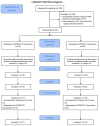Two Years Follow up of Domain Specific Cognitive Training in Relapsing Remitting Multiple Sclerosis: A Randomized Clinical Trial
- PMID: 26941630
- PMCID: PMC4763055
- DOI: 10.3389/fnbeh.2016.00028
Two Years Follow up of Domain Specific Cognitive Training in Relapsing Remitting Multiple Sclerosis: A Randomized Clinical Trial
Abstract
Cognitive rehabilitation in multiple sclerosis (MS) has been reported to induce neuropsychological improvements, but the persistence of these effects has been scarcely investigated over long follow ups. Here, the results of a multicenter randomized clinical trial are reported, in which the efficacy of 15 week domain specific cognitive training was evaluated at 2 years follow up in 41 patients. Included patients were randomly assigned either to domain specific cognitive rehabilitation, or to aspecific psychological intervention. Patients who still resulted to be cognitively impaired at 1 year follow up were resubmitted to the same treatment, whereas the recovered ones were not. Neuropsychological tests and functional scales were administered at 2 years follow up to all the patients. Results revealed that both at 1 and at 2 years follow up more patients in the aspecific group (18/19, 94% and 13/17, 76% respectively) than in the specific group (11/22, 50% and 5/15, 33% respectively) resulted to be cognitively impaired. Furthermore patients belonging to the specific group showed significantly less impaired tests compared with the aspecific group ones (p = 0.02) and a significant amelioration in the majority of the tests. On the contrary patients in the aspecific group did not change. The specific group subjects also perceived a subjective improvement in their cognitive performance, while the aspecific group patients did not. These results showed that short time domain specific cognitive rehabilitation is a useful treatment for patients with MS, shows very long lasting effects, compared to aspecific psychological interventions. Also subjective cognitive amelioration was found in patients submitted to domain specific treatment after 2 years.
Keywords: cognitive rehabilitation; multiple sclerosis; neuropsychology; randomize clinical trial.
References
-
- Amato M. P., Portaccio E., Goretti B., Zipoli V., Ricchiuti L., De Caro M. F., et al. . (2006a). The Rao’s brief repeatable battery and stroop test: normative values with age, education and gender corrections in an italian population. Mult. Scler. 12, 787–793. 10.1177/1352458506070933 - DOI - PubMed
LinkOut - more resources
Full Text Sources
Other Literature Sources


